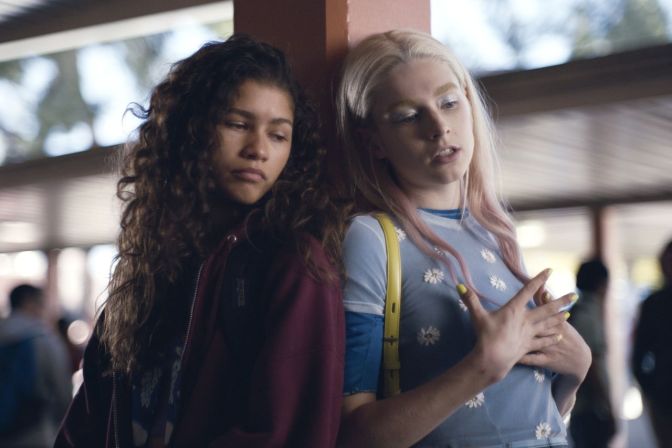Amidst the cacophony of penises, there was one moment in Euphoria’s premiere that really stuck out (pun, well, I’ll let you decide).

Chris McKay (Algee Smith) is with his girlfriend Cassie (Sydney Sweeney), about to engage in one of the show’s several sex scenes. Earlier in the episode, Chris is being “coached” about how to do it by his friends, a group of shirtless toxic trash heaps who trade naked pictures and sex tapes of her while calling her every kind of “slut” imaginable. They (including Chris’ two younger twin brothers) insist she’s into rough sex; Chris insists Cassie’s “not like that”, but the words impress on him enough that, when the time comes, he shoves her onto the bed and starts choking her. This encounter seems like a horrific sexual assault in the making, which our semi-omniscient narrator/protagonist Rue (Zendaya) acknowledges before laying out via Pornhub montage the cultural circumstances that led to this particular moment. Rue assures us that this moment won’t play out as we expect, and Chris pulls back when Cassie screams at him to stop. Instead of an ugly, misogynist and slut-shaming confrontation, the couple actually talk about what almost happened between them. It’s an awkward, honest, and even sweet discussion that touches on expectation, consent, boundaries, and sexual kink.

Chris and Cassie’s scene is remarkable, and not just how it subverts the initial set-up. It’s one of the few scenes in Euphoria’s debut episode that offers a unique point of view about the Gen Z debauchery the show captures so vividly. So much happens in this pilot, and it’s rendered with unflinching explicitness that actually does make 13 Reasons Why look like an after-school special: rampant drug abuse; unabashed talk about sex, the acts themselves which range from casually public pool party hookup to devastating statutory rape of a trans girl. And yet, Euphoria doesn’t offer much beyond “showing teens doing things they probably shouldn’t.” We’ve seen that countless times before, although with content much less explicit (so far, nothing has surpassed 1995’s Kids). What’s less common is Chris and Cassie’s conversation, which not only sounds close enough to how teenagers might actually talk to each other, but also champions sex positivity in an organic, genuine way. Better still, the couple present the possibilities of open dialogue about sex: not only is consent acquired and harm avoided, but it allows for a fruitful exploration of sexual desire that is bound to be both physically and emotionally satisfying. It’s a deceptively powerful message that doesn’t pontificate or condescend, but instead attempts to meet the show’s subjects on terms they can understand.

That approach is missing from the rest of the episode, which leads it to feeling like a formless but visually arresting stream of suburban teenage carnage. Rue is a compelling tour guide through her world of gas-station drug runs with 11-year old dealers, but it’s not clear, even after an extended opening monologue about her life, what fuels her addictions or her desire to remain addicted. We do get some truly stunning interpretations of Rue’s highs, a dark neon purgatory that is grotesque enough to not brazenly glamorize drug use. We also get several mini-vignettes about the ins and outs of Gen Z-dom – nude pics, porn, why you shouldn’t drink and bike, all the ways to successfully pass a random at-home drug test – that provide respites of black humor but nothing really insightful. The closest we get to insight apart from Chris and Cassie is through Jules (Hunter Schafer), the new girl in town who Rue is instantly enamored with. Jules is a young trans woman, and Euphoria treats her identity like a fact and not a plot point, which immediately feels revolutionary and will hopefully allow for more nuanced, organic stories about trans youth. Jules’s reliance on hookup apps for romantic companionship, and her naïveté about navigating the risks of these anonymous encounters, speaks to the danger that trans people experience every day, and ultimately culminates in the night’s most upsetting scene. There’s a lot we don’t know about Jules, but the opportunity to sit with a fully-formed character like her is more than worth the time.
Euphoria is the kind of show that people will talk about the next day. Audiences will recount how many penises they counted on screen (because in the year of our lord 2019, scenes with female nudity still vastly outnumber scenes with male nudity), or how many drug deals that kid drug dealer made, or the horrors of being a teenager in the post-Snapchat era (watching this episode made being an early-stage Millennial feel like a genuine privilege). However, once those titillating conversations taper off, there isn’t much left to discuss. That’s a shame, because many of the HBO-sanctioned elements are there: high production values, a solid cast (Zendaya and Hunter Schafer are obvious standouts), and a willingness to push the envelope. What’s missing is a sense of purpose, a point of view about this high-octane world of teenage angst and why it deserves the prestige treatment when Riverdale would suffice for many. Maybe they will lean into the power of enthusiastic consent and sex-positive communication with Chris and Cassie, or what teenage life is like for those who aren’t straight, white and cis through Jules and Rue. Either of these is good enough to form a compelling identity with.
You know what isn’t? Penises.
